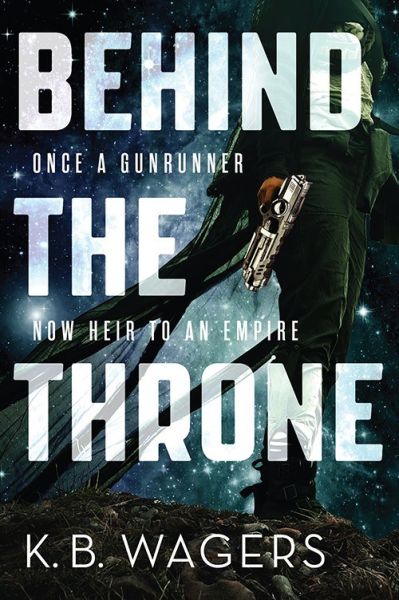For the love of God, SF, embrace the Enlightenment
Behind the Throne (Indranan War Series, volume 1)
By K. B. Wagers

21 Jul, 2016
0 comments
K. B. Wagers’ Behind the Throne, first in the Indranan War Series, is the story of a plucky gunrunner who rises to become the heir to the throne using only her wits, courage, and the fact that she is the sole surviving child of the reigning empress. It’s a rags-to-riches story that makes me wonder “why is so much SF inherently reactionary?”
Years ago, Hail Bristol walked away from her family and Indranan imperial politics, disheartened after her hunt for her father’s murderer ended in failure. Unfortunately for Hail, imperial politics did not walk away from her, which is why when the book opens she is lying in a pool of gore (her own), having barely survived an assassination attempt.
She’s luckier than her sisters and her niece, which means that Hail is now the only remaining legitimate heir. That in turn means Hail has no choice but to return to her home world Pashti and imperial politics. It’s not that she’s suddenly become a dutiful daughter; her mother has sent a heavily armed elite squad to drag Hail back to the court of worlds.
Once home on Pashti, Hail discovers a complication the Imperial court was very careful to keep secret; Hail won’t have the luxury of slowly reacquainting herself with imperial politics. Her mother the Empress has Shakti dementia, which is particularly aggressive and invariably lethal. The gunrunner turned Heir will have to hit the ground running.
But at least she will have the distraction of incessant attempts on her life. Her sisters and her niece are dead; the empress is doomed … and the shadowy figures who have been picking off the royal family one by one are free to focus their full energies on Hail.
~oOo~
A detail that I would have blithely passed over twenty years ago: the Indranan Empire is some 2500 years old, and (as far as I can tell) has adhered not only to the same matriarchal culture but to the same dynasty for millennia. That’s a remarkable degree of stability; there are terrestrial polities that have had comparable lifespans—but not many. All of these long-lived outliers have evolved over time. Not the Indranans. That strikes me as highly implausible. What about you?
Stability looms large in the worldbuilding here. The Indranans may sneer at the democratic chaos of the Solarian Conglomerate, but the Conglomerate settled Pashti three thousand years ago. This sort of extreme stability is far from rare in science fiction: Dune’s Old Empire lasted ten thousand years, Foundation’s Galactic Empire lasted twelve thousand years before its collapse, and the Norstrilia Instrumentality of Mankind not only matched the Galactic Empire, it never fell. Perhaps stasis makes worldbuilding simpler.
I never got the feeling that Hail earns her victories. She gains high office not because she shows any particular talent for the job or even a driving desire for it, but because her mother happens to be empress. She becomes the last heir standing in part because she is hard to kill, but also because the people around her are willing to sacrifice their lives to preserve Hail’s. Other authors have made similar situations work — the protagonist in The Goblin Emperor is handed the throne through no particular virtue of his own, for example — so this is not an unworkable idea for a book. This particular example just seems to be missing something.
This is castle opera as depicted by an author who has taken the POV of the elite. The fact that Hail spent years as a criminal on the edge of society does not seem to have left her with much sympathy for the little people. Hail embraces her inflexible, hierarchical society wholeheartedly. There are would-be reformers but they exist mainly to make the list of suspects longer. The revolution I ordered never arrived.
In the last week, Facebook’s On This Day offered up a post wherein I grumbled that the next SF book I read better not be yet another feudal state IN SPAAACE. I would guess that authors love the narrative simplicity of feudal societies (in part because fictional feudal societies are ridiculously simple toys compared to historical feudal states). I can understand why authors make these choices, but they annoy me more every time I encounter them.
You may disagree. If so, Behind the Throne is available here.
